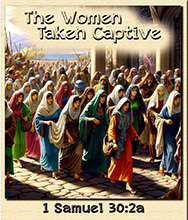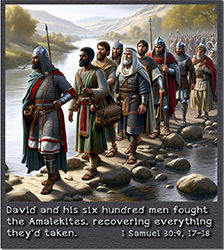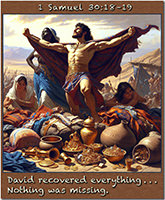1 Samuel 30:1–31 . . . Bible Study Summary with Videos and Questions
“David Is Again Victorious”
Today we'll hopefully learn how to share some of the gifts we receive. David and his men are in pursuit of a band of Amalekite raiders, who've plundered and destroyed Ziklag and taken away their wives, children, and possessions. They were guided to the base camp of these raiders, where they utterly defeated them, recovering everything they'd lost. In addition, the spoils of this victory included all that had been taken from the Israelite and Philistine towns and cities the Amalekites had raided and plundered, in addition to Ziklag. Some among David’s soldiers were unwilling to share any of these spoils with the 200 men who, because they were exhausted, stayed behind with the gear. As you read and discuss this summary, imagine how you might have responded to this gift-sharing opportunity.
[Note: Click the link to This Week’s Passage near the bottom of this page to read today’s Scripture.]
David and His Men Wept Aloud (30:1–6a)
David Destroys the Amalekites
30 1David and his men reached Ziklag on the third day. Now the Amalekites had raided the Negev and Ziklag. They had attacked Ziklag and burned it, 2and had taken captive the women and everyone else in it, both young and old. They killed none of them, but carried them off as they went on their way (1 Sam. 30:1–2).
"On the third day" indicates that David and his men covered about twenty-five miles a day on the march south from Aphek to Ziklag, where they'd have arrived tired, hungry, and expecting all the comforts of being home. However, while David and his men were in the north trying to join the Philistine army, their own city of Ziklag was unguarded. The opportunistic Amalekites took advantage of the defenseless city, attacked it, and burned it to the ground. They'd even taken captive the women and men who were there, from small to great. Not only was the city burned, but all their women and children were taken away.
When David and his men approached the city of Ziklag, they were horrified to see that it had been destroyed and their families taken captive. No one had been killed; every living soul had been captured; it was little comfort that their families were still alive. Each man imagined what had happened (or would soon happen) to his wife and children. At best, they'd become slaves who'd be worked hard and treated cruelly. Add to this the reality that David’s two wives had also been taken. In our culture it's considered a sign of weakness for men to weep in public. But in the Middle East, men mourn just as openly as women. And David's men have lost everything dear to them.
David and his 600 fighting men were greatly distressed by what had happened to their city and families; all had been lost; they all wept aloud, beginning to think how this tragedy happened. It had been David’s plan to bring them to the land of the Philistines (27:1–4); it was David who'd requested that they live in the remote city of Ziklag (27:5–6); and it was David who led them off to fight with the Philistines, leaving their families vulnerable to just such an attack. Some of his men were so angry they talked of stoning him.
David Wins Back What Was Lost (vv. 6b–10)
6David was greatly distressed because the men were talking of stoning him; each one was bitter in spirit because of his sons and daughters. But David found strength in the LORD his God (1 Sam. 30:6).
It took a lot for David to find strength in the LORD. Now, God was his only strength. This was backslidden David, wayward David, and "let's join the Philistines" David. Why would God strengthen him? Because God is rich in mercy and grace, and because David was now completely broken, ready to be filled. Sometimes we think we have to do something before we can achieve God's blessing or strength, but David shows us another way.
Not since chapter 23 has David sought God’s will by means of the ephod, and not since chapter 26 has he mentioned the name of the LORD. As is often the case, tragedy turned David’s heart toward the LORD. Today's chapter shows another of David’s finest hours. He first strengthened himself in the LORD, then turned to the LORD for specific guidance concerning their families and those who'd kidnapped them. He asked the LORD to reveal if he should pursue those who'd taken their loved ones. Would he overtake them if he pursued them? “Yes!” God assured David that he'd not only overtake the band but he'd also completely recover all that had been taken.
We must remember the physical and mental condition of these men. They'd just traveled nearly 60 miles from Aphek back to Ziklag, no doubt pressing hard to get home as soon as possible. They could have rested up at Ziklag, once they arrived, or so they thought. Then, finding their loved ones kidnapped, their cattle stolen, and their city destroyed by fire, they wearied themselves weeping (v. 4). So they took off in hot pursuit of the enemy raiding party that had a substantial lead, and the trail was getting cold. The enemy could have easily disappeared into the wilderness. If they were to overtake them in time, to rescue their loved ones, David and his men would have to have moved quickly.
"But David found strength in the LORD his God." As a result, it was time for him to do something with that strength that came from the LORD. David used that strength when he inquired of the LORD. Since David had been among the Philistines, and during his time of compromise and backsliding when he simply didn't inquire of the LORD, this is the first time we read of him seeking God in some way.
What did David ask the LORD? He asked (v. 8), "Shall I pursue this raiding party? Will I overtake them?" At one time, David wouldn't have asked such questions. He'd have simply done it because, when a soldier is attacked, he attacks back. But, returning from his backsliding, David brought everything to the LORD. He asked God about everything.
How did God answer David? "Pursue them . . . You will certainly overtake them and succeed in the rescue." God first gave David something to do: pursue. Then, he gave David his encouraging promise. When God gives us something to do, he accompanies that task with his encouraging promise.
David inquired of the LORD the way God said to inquire of him; he sought God with the help of a priest, almost certainly using the Urim and Thummim that were part of a priest's ephod. Realize that an ephod was a special apron that priests would wear to cover their clothing so that sacrificial blood and gore wouldn't splash on their clothing. It's likely that this wasn't just any ephod; it was the high priest's ephod, which had the breastplate of judgment (Exodus 28:15) attached to it (28:28). Within that breastplate was a pouch holding two stones known as the Urim and Thummim (28:30). When David inquired of the LORD, he probably asked Abiathar to use both stones.
The names Urim and Thummim mean "Lights" and "Perfections." We aren't sure what they were or how they were used. Most think they were a pair of stones, one light, the other dark; each stone indicated a "yes" or "no" from God. The idea is that a high priest would ask God a question that could be answered with a "yes" or a "no," reach into his breastplate, and pull out the one stone that indicated God's answer. In seeking God through the Urim and Thummim, David was really going back to God's Word for guidance because it was the word of God that commanded the stones placement and allowed their use. Today, if we give the same focus to God's Word, he'll guide us as well.
9David and the six hundred men with him came to the Besor Valley, where some stayed behind. 10Two hundred of them were too exhausted to cross the valley, but David and the other four hundred continued the pursuit (1 Sam. 30:9–10).
As time passed and sun's heat worked on David and his men, making them weary. When they came to Besor Brook, a third of the men simply couldn't go on. They had plenty of motivation — their families were in danger and they wanted to be there to rescue them — but they simply didn't have the strength to press on. Two hundred men collapsed by the brook, unable to continue. So, David and the other 400 men did press on, leaving much of their gear behind with the 200 so they could move faster and expend less energy.
In vv. 9–10, we see David and his 600 men on a mission of pursuit. The Amalekites had recently raided and burned the city of Ziklag, where David and his men were living, and had taken their wives, sons, and daughters captive. After seeking guidance from the Lord, David was told to pursue the Amalekites, as he’d surely overtake them and rescue everyone.
This passage highlights a key moment in David’s leadership. He recognizes the limitations of his men and doesn’t force the exhausted soldiers to continue, instead appointing them to guard the baggage. This act of compassion and wisdom allows the rest of the fighting force to proceed quickly, which is crucial for a successful pursuit.
Befriending a Helpless Egyptian before Winning Back Everything (vv. 11–20)
As David and his men pursued the Amalekites, they come across a man collapsed in the wilderness. It would have been easy, perhaps logical, to ignore the man because they'd a much greater mission to accomplish. But they showed unexpected kindness to the man, giving him food and water. The Egyptian was near death; he hadn't eaten bread or drank water for three full days. David and his men provided an unexpected kindness to this man, documenting that David was genuinely living with God's heart. Having seen David show unexpected kindness to the Egyptian, God gave David an unexpected blessing. The helpless man promised to guide David and his men there. Catching the Amalekites in the midst of their victory celebration, David and his men attacked them from twilight until the evening of the next day (v. 17). How surprised the Amalekites must have been! They figured that all the Philistine and Israelite armies were far to the north, preparing to fight each other! They weren't expecting this army that was neither Philistine nor a contingent of the Israelite army.
Everything that the enemy had taken, David recovered. The Scriptures confirm why God gave him a complete victory: David strengthened himself in the LORD his God (v. 6), David inquired of the LORD (v. 8), David did what God told him to do, and David showed unexpected care and kindness to others. God's promise proved true. When David inquired of the LORD, God promised: "You will certainly overtake them and succeed in the rescue" (v. 8). The promise was fulfilled exactly, but God used David's actions to fulfill his promise, which didn't exclude David's cooperation, it invited it. God provided David with so much because of David’s faith and obedience to him. God considered David a “man after his own heart” (Acts 13:22), not because David was perfect, but because his heart was aligned with God’s will.
God gave David even more than what was promised. He gave David back all that was taken, which included his two wives, the women and children, and all the possessions of his men. This recovery went beyond what was promised because David also reclaimed the spoil that the Amalekites had taken from other groups, which was a significant, un-promised bonus: He received the plunder from the battle, beyond what had been taken from Ziklag. This was a blessing that came as a direct result of God's grace.
The Plunder Gets Divided (vv. 21–31)
We see in vv. 21–25 that the spoils were distributed equally among those who fought and those who supported the battle effort. Apparently, when David was in swift pursuit of the Amalekites, 200 men among his company couldn't continue on so they made a camp where they were and lightened the supply load of the soldiers who'd continued on. Now, David returned to those 200 men who stayed at the supply camp, men who'd seen their own possessions among the spoils of battle and wanted them. Some of David's "wicked and worthless men" protested, arguing that those 200 exhausted men could recover only their wives and children, not their possessions. But David wisely declared an important principle to everyone: Supply lines are as vital as the fighting soldiers, and God will appropriately reward the "soldiers" and the "supporters." Today, many people serve the LORD in invisible, behind-the-scenes ways, often supporting much more visible aspects of the LORD's work. In turn, God will provide an inconspicuous servant with the same reward as a prominent servant.
The wicked and worthless men looked at the spoil and said, We fought for this spoil and it is ours! David looked at the spoil and said, Look at what the LORD has given us! When you look at it that way, how could you not share? When the LORD had given David such a great victory, he saw it as the LORD's victory, not his own. This principle was so important that "David made this a statute and ordinance for Israel from that day to this" (v. 25).
David knew that his time with the Philistines had strained his relationship with God's people. He knew that he had to do something meaningful to make things right again, so he sent some of the plunder to the elders of Judah (vv. 26–31). This was the final step in David's getting things right, after his time of backsliding among the Philistines. With spoils to spare from the battle, David sent some of that plunder to more than thirteen cities.
Closing Considerations

1 Samuel 30:19
After an exhausting three-day journey, David and his men finally arrived home to find a scene of devastation. Their homes were burned to the ground and their families were missing. Utter despair engulfed them. David’s distress soon increased when his men’s grief turned into bitter anger and spoke of stoning him.
Most of us won’t experience this extreme a situation, but we can identify with David’s discouragement. Sometimes despair follows a personal tragedy or loss, but it can also result from the weariness of ongoing daily pressures. Family problems, financial difficulties, and health issues may make discouragement a constant companion. The same can happen with emotional struggles over feelings of unworthiness, failure to overcome an addictive habit, the pain of criticism, or fear of inadequacy.
Despair can afflict anyone unexpectedly, but the LORD doesn’t want us to linger in a fog of depression. We often can’t avoid the situations that lead us into discouragement, but we do have a choice of whether to stay in that condition. Instead of caving in to misery, David chose to strengthen himself in the LORD. He recognized that God was the only one who could give him the proper perspective on the problem and provide the guidance he needed.
When you’re discouraged, where do you turn? Perhaps the last thing you want to do is read Scripture and pray — initially, the passages may seem like meaningless words, and your prayers might feel empty. But if you persist in crying out to God in a sincere and hearty manner, you’ll eventually experience his comforting strength.
How did David strengthen himself in the LORD?
† David strengthened himself remembering God's love. Facing total loss, he saw the love of the LORD in the Philistine leaders' rejection of him. If they'd not sent him away, he and his men wouldn't have returned when the Amalekites had just left and their destructive fires were still burning. If God hadn't sent him back home, it would have been months until he returned, and the situation would have been far worse.
† David strengthened himself remembering God's promise and calling. He may well have shook his head, cleared the fog that had set in during the last year or so, and said, I'm a man anointed by God, called by God, and promised by God to be the next king of Israel. I have a high calling and promise from God, and he hasn't taken that away. I need to start living according to that destiny.
† David strengthened himself remembering God's past deliverances. He could also have thought, This is a terrible spot, no doubt. But I remember all the times when the LORD delivered me out of bad spots. If He did it then, He'll do it now. He didn't deliver me before, just to let me perish now. Indeed, David grew stronger and stronger in the LORD.
† Summary of 1 Samuel 30:1–31
This passage tells the story of David’s crisis and triumph after the Amalekites plunder and burn Ziklag. Upon returning from being dismissed by the Philistine army, David and his men find Ziklag destroyed and their wives, children, and all possessions taken captive (30:1–3). Overcome with grief, the men weep until they have no strength left, and in their despair, they even speak of stoning David (vv. 4–6a). But David finds strength in the Lord and seeks his guidance through Abiathar the priest and the ephod (vv. 6b–8). God answers, telling David to pursue the Amalekites with the promise that he will recover everything.
David sets out with 600 men, but 200 are too exhausted to continue and remain at the Besor Valley while 400 pursue (vv. 9–10). Along the way, they find an abandoned, starving Egyptian servant of an Amalekite, who’s revived with food and drink. In exchange for safety, he leads them to the Amalekite camp (vv. 11–15).
David launches a surprise attack, striking them for almost a full day and recovering every person and possession taken — including both of his wives (vv. 16–20). On the return, a dispute arises: Some men don’t want to share the plunder with those who stayed behind. David rebukes this selfishness, establishing that all will share alike — whether they fought in battle or guarded supplies (vv. 21–25). This principle becomes Israelite policy from then on.
David also sends portions of the plunder as gifts to the elders of Judah and to various towns that had supported him during his wanderings, strengthening alliances and showing gratitude (vv. 26–31).
Key points with verse references:
• David and his men return to find Ziklag destroyed, their families and possessions taken by the Amalekites (vv. 1–3).
• Deep grief turns to bitterness against David, but he finds strength in the Lord and seeks God’s direction (vv. 4–8).
• David pursues with 400 men; 200 remain behind due to exhaustion (vv. 9–10).
• An abandoned Egyptian servant leads David to the Amalekites after being revived with food and drink (vv. 11–15).
• David’s forces rout the Amalekites, recovering every captive and all possessions (vv. 16–20).
• David decrees that both fighters and those who stayed with the supplies share equally in the spoils (vv. 21–25).
• David sends gifts from the plunder to elders of Judah and towns that had shown him loyalty (vv. 26–31).
This Week's Passage
1 Samuel 30:1–31
New International Version (NIV) [View it in a different version by clicking here; also listen to chapter 30 narrated by Max McLean.]
† Summary Video: “The First Book of Samuel”
† Watch this introductory video clip created by BibleProject on bibleproject.com.
- Q. 1 How do you think David found strength in the Lord (v. 6b)?
- Q. 2 With whom would you like to be especially generous this week? Why?



